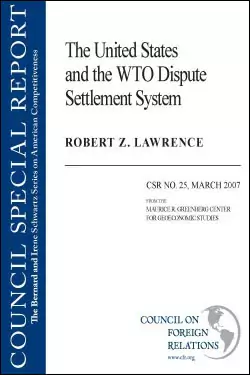
The United States and the WTO Dispute Settlement System

- Council Special Report
- Concise policy briefs that provide timely responses to developing crises or contributions to current policy dilemmas.
Overview
The Doha negotiations have stalled since last summer, and, as the November elections in the United States highlighted, American advocates of economic nationalism are growing in strength.
Nevertheless, Robert Lawrence makes a case for the effectiveness of the World Trade Organization (WTO), particularly its dispute settlement system, and the benefits that would accrue to the United States and others from improving its effectiveness. These benefits include expanding world trade and increasing support for an often beleaguered organization that is central to the conduct of world trade.
More on:
In this Council Special Report, Professor Lawrence addresses the critics of the dispute settlement mechanism—both those who think it should be tougher on countries that violate trade rules and those who think it is already so tough as to violate sovereignty. He points out the successes of the WTO since its creation in 1995 and argues that radical changes to the system are ill-advised. Lawrence nonetheless suggests several areas for reform, from steps that require multilateral negotiations, such as improving opportunities for nonstate actor participation in and enhancing transparency of the process, to changes the United States could make in its own behavior.
Part of the Bernard and Irene Schwartz Series on American Competitiveness.
More on:
 Online Store
Online Store